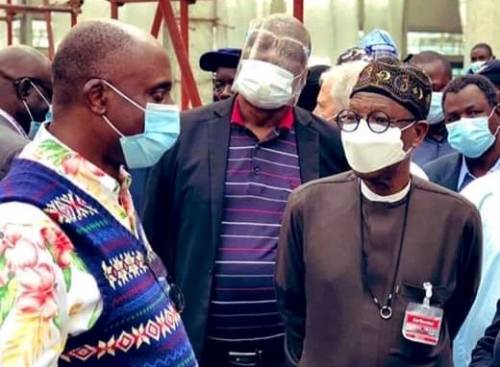…to wrestle lost cargoes from Ghana, Togo, Benin
Paul Ogbuokiri
As the promoters of the Lekki Deep seaport sets to complete the construction of the first phase of the port in readines for its comissioning by the fourth quarter of this year, the Federal Government has disclosed that the port will have over $321 billion revenue and business impact on the Nigerian economy in 45 years.
Minister of Information and Culture, Alhaji Lai Muhammed stated this after a tour of the port on Wednesday, also said that the port is capable of generating $158 billion through direct and induced business impact.
He said with this, the port would wrestle lost cargoes from West Africa countries, such as Ghana, Togo and Benin Republic.
Lai Mohammed, further stated while addressing newsmen on the benefits which the Port would attract to Nigeria that Lekki Deep Seaport will be a “the game changer” in the maritime industry in West and Central Africa.
The Minister explained that he calls it a game changer because of the impact it will have on the nation’s economy and the jobs it will create, among others.
According to him, the investment is huge: $1.53 billion on fixed assets and $800 million on construction, adding that the aggregate impact has been put at $361 billion in 45 years, which will be over 200 times the cost of building it.
” In addition, it will create 169,972 jobs and bring revenues totalling $201 billion to state and federal government through taxes, royalties and duties.
“The direct and induced business revenue impact is estimated at $158 billion in addition to a qualitative impact on manufacturing, trade and commercial services sector.
“Beyond that, when it begins operation in the last quarter of this year, it will make it possible for Nigeria to regain the maritime business that was lost to ports in Togo, Cote d’Ivoire and Ghana. It is also a big boost to Nigeria in its quest to take advantage of the implementation of the African Continental Free Trade Agreement (AfCFTA).
“A major advantage we have to leverage is transshipment. With this port, Nigeria will become a transshipment hub and the revenue we are currently losing to our neighboring countries will come here.
“As you know, this project is being done in phases. Phase 1 has reached 89 percent and will be completed in September this year” he added.
The Minister further stated that the facilities are first class, and the facility will have seven ship to shore cranes and 21 RTG cranes, noting that presently, no port in Nigeria currency has such.
He said the excellent equipment is why the port can do 18,000 teus, which according to him, is more than four times the number that can currently be handled by our other ports.
The Executive Secretary of the Nigerian Shippers’ Council, Emmanuel June, who also spoke expressed fear of a repeat of the problem currently witnessed along the access roads to the seaport in Apapa.
“I am worried about how cargos will be evacuated when the seaport eventually comes mainstream” he added.
On his part, the Managing Director of the Nigerian Ports Authority (NPA), Mohammed Bello-koko, assured stakeholders of the preparedness of government to carry out it’s responsibilities when operations at the port commence.


